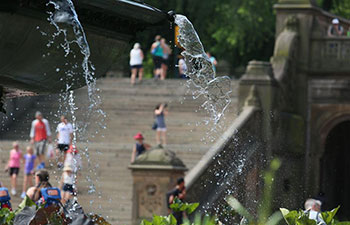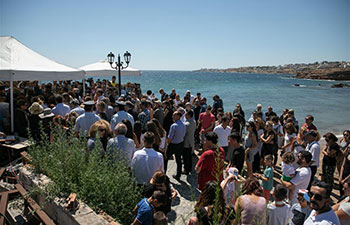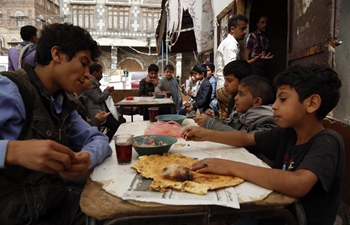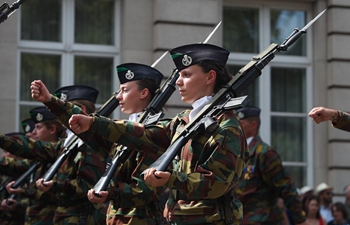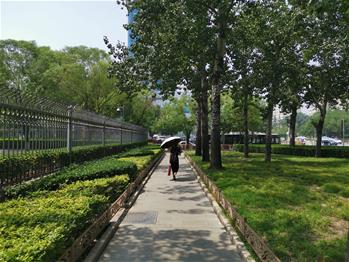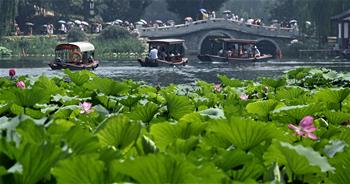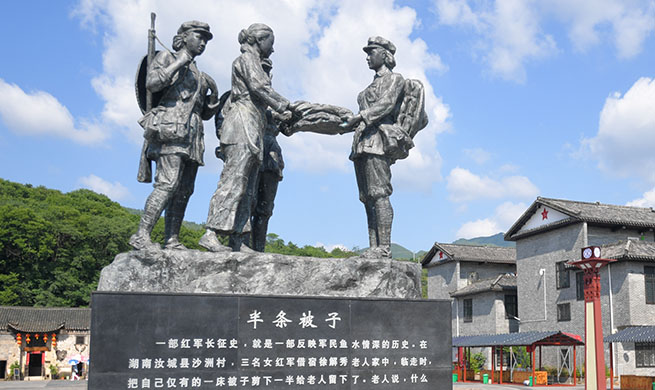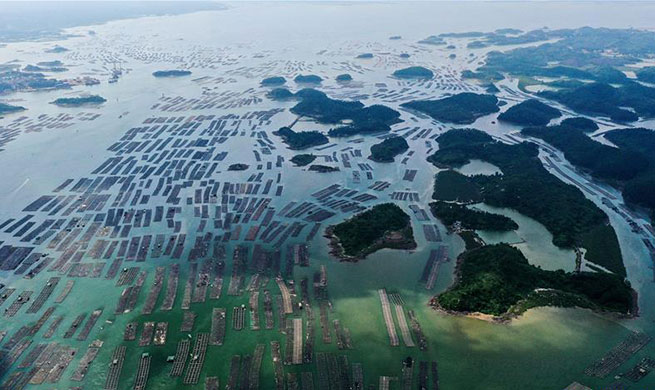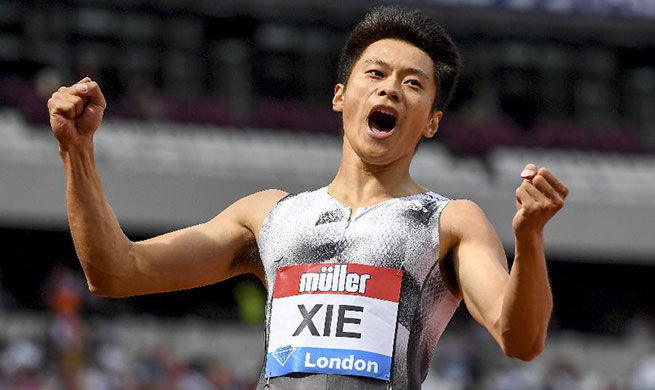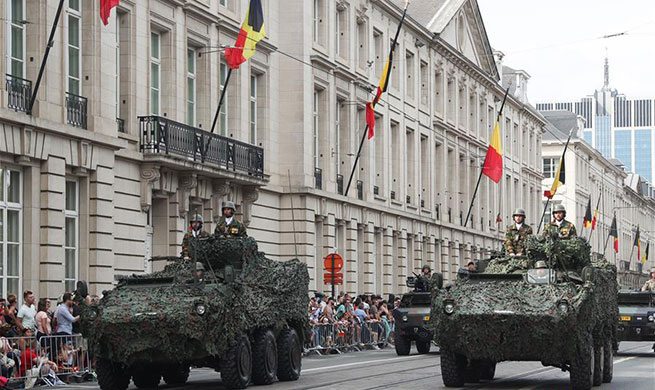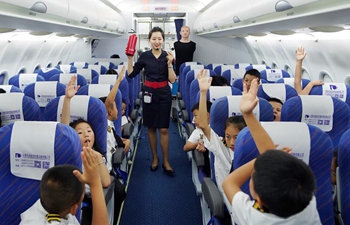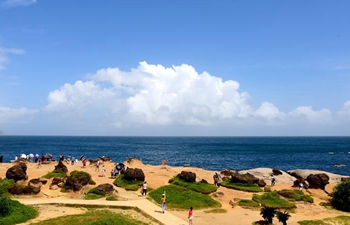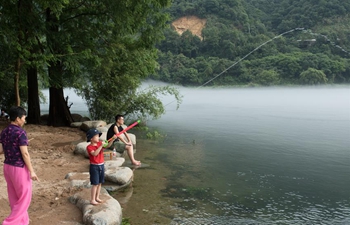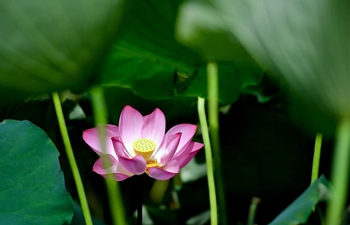By Jonathan Dixon
NANJING, July 22 (Xinhua) -- It was a muggy Wednesday in Nanjing. Manchester City had just strolled to a 4-1 victory over West Ham in the Premier League Asia Trophy. Backstage, a gaggle of excited Chinese supporters wait patiently for legendary manager Pep Guardiola to leave the stadium and make his way onto the team bus. Suddenly, there are cries of "Pep, Pep, Pep," and "Over here, gaffer!"
Flanked by two security guards, the manager strolls out. As he gets closer to the fans, the calls get louder and more frantic, for this might be the only opportunity they get to meet their hero. As he draws level with the Chinese fans, the excitement reaches fever pitch, then suddenly dies. Without breaking stride and with eyes fixed on the empty space ahead of him, the manager walks on by, shielded by his two heavies.
Taken alone, it might have been excusable as a one-off occurrence, perhaps due to jetlag or a packed schedule. But unfortunately for Chinese fans here and local media, it proved to just be one example among many of the utter disrespect shown by Manchester City to their hosts during their tour of China.
For the Premier League champions, their appearance in China was nothing more than a commercial obligation, and their lack of enthusiasm and the indifferent treatment of their hosts stands in stark contrast to representatives of other clubs.
The difference is palpable. This year's Asia Trophy has borne witness to a huge contrast between the treatment of Chinese fans and those from abroad. There has been a huge contrast between the treatment of Chinese media and foreign media. And there has been a huge contrast between the behavior of Manchester City and the other teams in the tournament.
For Wolverhampton Wanderers, for example, fan interaction was the cornerstone of their trip to China, with players and coaches doing everything they could to engage with fans and show them a more personal side to the club. The tournament's other two teams, Newcastle United and West Ham United, sent some of their stars to help out at an Under-12 football tournament in Nanjing on Tuesday, surely an experience the youngsters will never forget.
In contrast, Manchester City CEO Ferran Soriano gave a presentation entitled "City Football Group: Creating a Truly Global Football Footprint" that focused on how the club could best commercially expand into China and look to relieve Chinese football fans of their money.
Despite autograph signing sessions for exclusive VIP ticket holders - those with the money to pay for it - the reality of City's time in Shanghai and Nanjing seems a long way from the promises of "hosting exciting events in China and welcoming local fans to our matches" made by COO Omar Berrada back in March.
In addition to this, the Manchester City press operation has been woefully lacking. Looking back to 2015, when Manchester City hosted a senior Chinese delegation, the club looked to be making great efforts to show China and the Chinese fans the respect they deserve. Fast forward almost four years and City sent neither their director of communications nor their lead press officer, instead wheeling out a junior member of the media staff who arrived embarrassingly underprepared for the task at hand.
The result has been that Chinese media have been ignored and sidelined during the duration of the trip, with City only fulfilling contractual obligations, and doing so less than enthusiastically. PP Sport, the Chinese media partner of the tour, was only given fewer than five minutes of a pitchside interview with manager Pep Guardiola, whereas British TV partners received a 15-minute sit-down session.
On top of this, the Chinese media found themselves excluded from a number of other events, including opportunities to talk with and ask questions to some of the City players. Following the final pre-match press conference on Friday, British media were invited to sit down with new signing Rodri, whereas Chinese media were ushered away on to a bus before they could see what they were missing out on.
This discrimination was only highlighted further at a Puma commercial event in Shanghai on Friday. During the event, Chinese media were surprised to see themselves segregated from their foreign counterparts. Foreign media had the privilege of interviewing young starlet Oleksandr Zinchenko, whereas the segregated Chinese media could only listen to questions asked by City's own television station to the players at the commercial event and were denied to chance to ask their own.
During the Puma event, a Xinhua reporter asked City press officer Alex Rowan to explain the difference in treatment. Rowan was unable to give a straightforward answer, instead blaming the decision-makers "above his head." As frustration amongst the Chinese press corps began to mount as the foreign media had their opportunity to interview Zinchenko, Rowan was then asked about whether Manchester City cared that Chinese media were receiving second-class treatment and had been segregated from the foreign press, he simply proffered "no comment."
At the event, which only served to highlight Manchester City's desire to win wallets, not hearts and minds, Xinhua also spoke to a number of the assembled Chinese fans. Many had waited several hours to see their heroes, yet as the players exited the store, many fans found their requests for photos and autograph rejected, with only a tiny minority getting the chance to meet the stars.
Zhang, who had traveled from Hangzhou for the chance to meet the players, spoke about his disappointment at the event, "I traveled here to Shanghai from Hangzhou really early this morning, and I have been waiting here for five hours. I was so disappointed to not even get the chance to say hello."
Fans Xinhua spoke to in Nanjing repeated this sentiment. Xiao and Wu, who support Manchester City and the Wolves respectively, had both traveled to the game together from Shandong. Xiao told Xinhua of his envy that his friend Wu had had the chance to meet Wolves players, whereas for him any chance of meeting the City stars in Nanjing was zero, unless he could afford the 1,088 yuan VIP tickets for the game that evening.
Indeed, other than at the Puma money-spinner, the only chance fans had to meet and perhaps get an autograph and picture with their heroes was by purchasing the VIP tickets (1,088 yuan in Nanjing and 1,580 yuan in Shanghai). However, any hopes event these VIP fans had to meet most of the players after the game in Nanjing were dashed, as only a handful made the effort to interact with as many fans as possible. But while several of the players reluctantly stopped for a few selfies and a couple of autographs, Pep Guardiola himself walked straight past these committed fans without a single look to them, accompanied by security.
Shanghai, too, saw the players race to get on the team bus. And as the City fans gathered outside the front gate to say goodbye to the superstars, the bus instead left unseen via the rear exit.
The air of exclusivity and desire for the Chinese Yuan that defined Manchester City's events and their entire time in China was further personified when fans were excluded from an "open" training session. Instead of inviting ordinary fans, the only people invited were commercial partners, KoLs and foreign media.
Compare this to the openness shown by the club to fans in America last summer and the contrast is especially stark.
In fact, it was reported last summer that Pep Guardiola had made clear his distaste for a pre-season tour in China, instead preferring the U.S., with commercial considerations reported by the UK's Daily Mirror as the sole reason for the visit to Shanghai and Nanjing.
City's seriousness, or lack thereof, as evidenced in the team lineup in Nanjing. Naming a youthful side, the focus for City was to clearly just get through the 180 minutes with as few injuries as possible, a point that was reiterated in the press conference by Guardiola. When asked whether the side was taking the tour seriously, the manager responded with a curt "as much as possible."
This was in a press conference in which the City press officer announced that the club would only accept a single question from reporters in the room. This typified the difference from the other teams on the tour, who did not restrict the number of questions per reporter.
Compare the attitude of City to that of Wolves. When asked about his time in China, Wolves head coach Nuno Espirito Santo responded with enthusiasm. "We're really satisfied to be here, we're very excited to see the country and the cultural sites. We are so welcome here."
Wolves defender Conor Coady echoed the sentiments of the manager, "The fans have been amazing for us. It has been great to meet them at events off the pitch and on the street. The way the people have taken to Wolves and taken us in, showed us their support, it's been fantastic."
While the other clubs were here chasing hearts and minds among locals, extracting cash from the pockets of fans has appeared to be the only consistent goal for Man City here in China. Engagement with genuine ordinary fans was seen as a chore rather than a privilege, and it's baffling to think how any team manager could assume that this is a viable way to make inroads in the exploding Chinese sports market.
For Manchester City, they saw their recent success as a reason not to treat Chinese and foreigners with the same respect. Above all, it was an orientalist expectation on display by the Manchester City press relations staff that Chinese media would operate as an extension of their PR department, rather than as serious football journalists.
An attitude of arrogance and the belief that they were the main attraction to the Premier League Asia Trophy was misplaced and stood in direct contrast to the other clubs. Wolves could not do more to engage with fans and even Newcastle, despite arriving under a cloud of off-field negativity, treated China with the utmost respect and dignity. Today those clubs leave China with a new-found respect and new fans; Manchester City leave China with neither.




